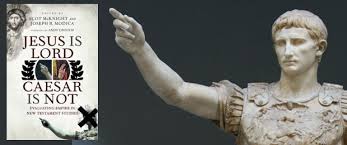Anyone at all familiar with the Gospel of John knows that it begins with the logos hymn, and that that hymn in a significant way sets the agenda for what follows, especially Christologically. Knowing where the Son came from, and where he is going is the key to knowing who Jesus is. The characters in the narrative, apart from Jesus, do not know he is God the Son prior to the resurrection, and so they make all sorts of false judgments about him, or at least inadequate ones. The crescendo of confessions in this Gospel does not climax until Thomas, formerly unbelieving, confesses Jesus to be his Lord and God, matching up with what the Prologue in John 1 asserted. How is all this relevant to the discussion of possible anti-imperial rhetoric in the Gospel John. Let me count the ways, but perhaps it will be enough to say first that nothing in the rhetoric about Emperors, the rhetoric connected with the imperial cult is like John 1. The discussion of a pre-existent Logos has no parallel in imperial cult propaganda. And yet it is the rhetoric of Logos which sets the agenda in this Gospel. It is one thing to talk about the apotheosis of a hero figure. Quite another to suggest that he personally came down from heaven in the first place. This was not claimed about the Emperors (see p. 126).
Skinner is thus correct to conclude (p. 128) that the pressing issues in the Fourth Gospel are all Jewish ones. Greeks seek Jesus to be sure (probably Greek speaking Jews), and the Roman authority finds no real fault in Jesus, both the concentration is overwhelmingly on Jewish matters, Jewish disputes, all presented in Jewish sapiential ways.
In his chapter on John and anti-imperial rhetoric, C.Skinner also rightly points out that Christ is compared in this Gospel to: 1) God; 2) Wisdom; 3) Moses, but he is not compared to Caesar, unless indeed we see such a comparison in Thomas’s confession, in which case there is an indirect comparison. But confessions are tricky business. Thomas is not confessing that Jesus is God and Lord, over against Caesar (about whom no comment is made). He is confessing ‘my Lord, and my God’, something many pagans could have done with regard to a whole series of deities. The fact that the author of John is indeed a monotheist means of course that he thinks there are no other gods or lords in the sense that he uses those terms. Certainly there are no other risen Lords like Jesus (N.B. Dionysius and other such figures are not said to come back to life with resurrection bodies).
Skinner concentrates in his analysis of John on the work of Tom Thatcher and Warren Carter, and to a lesser degree Lance Byron Richey as a representative sampling of those who think there is something to the theory of anti-imperial rhetoric in John. On the surface there is a feature in this Gospel which might be thought to favor it, namely the theme of expulsion from synagogues. If Christians were not seen as Jews, then they would not have had the Jewish-exemption from Emperor worship. This could have caused problems. The problem with this kind of analysis is: 1) expulsion from synagogues is an intra-Jewish matter, not a Roman matter, and it is not clear John is concerned about the loss of religio licita status for his audience. Besides, worship of the Emperor seems to have been voluntary in the first century, and in any case was overwhelmingly just the concern of the elites who wanted, or wanted more benefactions from Caesar. The rise of the Imperial cult did not have to do with the rise of a religious revival movement, nor could it really be said to be an entirely new development of any sort since it was based on and a development of the long standing practice of ancestor worship. It is in the second century when affirming the genius of the Emperor and pouring out a libation to him became a loyalty to the Empire test for Christians turned in by pagans or Jews who didn’t like what they were doing that we have problems. It is not clear that the Gospel of John, written at the end of the first century A.D. reflects that social situation.
Skinner is right that it is an argument from silence by Carter and others to talk about the ‘rhetoric of distance’ and use that to explain the absence of explicit references to Rome in John’s Gospel. This is surely a very peculiar argument from silence, and anyway John 18 is hardly silent about Jesus and the representative of Empire– Pilate, who finds no fault in Jesus, and Jesus, meanwhile suggests Pilate has legitimate power, but that it comes from God, not the Emperor. Jesus believes in God’s sovereignty, not the Emperors omnipotence. Skinner points out as well that one of the problems with Thatcher’s approach is that he assumes that the Jewish authorities are simply puppets of Rome, and ciphers for Roman authority. So if Jesus critiques the former, he has critiqued the latter. The problem with this whole theory is John 18 paints Pilate at odds with the Jewish authorities and not wanting to give them what they want, not enjoying being manipulated by Caiaphas, and only capitulating when there is the threat he will stop being the BFF of the Emperor (through a nasty report from the Jewish authorities to Tiberias).
In short, Pilate comes off looking like a more fair representative of justice than the Jewish authorities and in any case not happy about being manipulated by them.
I, as well as Skinner, would disagree with Thatcher that Roman imperial terminology is foundational to the Christology of this Gospel. To the contrary, Jesus is being depicted in terms already used of Jewish Wisdom in earlier Wisdom literature, to which is added the notion that Jesus is the risen Lord (at the end of this Gospel), something never claimed about an Emperor. In short the tensions in this Gospel seem to be between the followers of Jesus, and non-Christian Jews, hence the references to synagogue expulsions. This continued to be an issue in the Diaspora, as the various tales about Paul in Acts, and in the hints in 2 Cor.11 about Paul’s synagogue beatings indicate.












